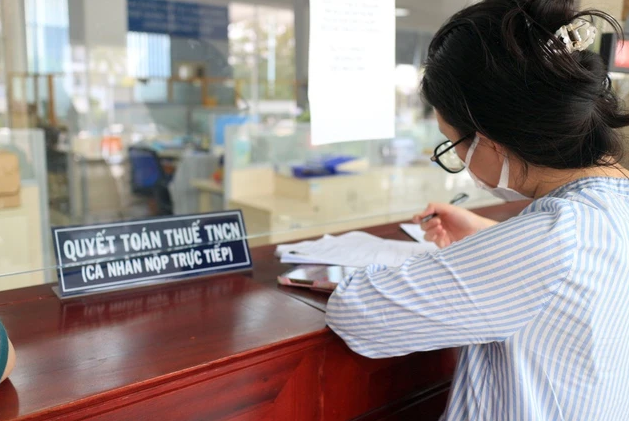 Economy
Economy


|
| A taxpayer files a personal income tax declaration at a local tax office in Hà Nội. — Photo thanhnien. |
Compiled by Mai Hương
The draft revision of the Personal Income Tax Law is drawing widespread attention, particularly from high-earning single taxpayers, amid concerns about a top rate of 35 per cent.
The Ministry of Finance (MoF) insists that the reform actually reduces the tax burden compared with current rules.
A software engineer in Hà Nội with no dependents, earning about VNĐ100 million (US$3,846) a month, said: “After the single deduction of VNĐ15.5 million and nearly VNĐ5.5 million in mandatory insurance, my taxable income still reaches about VNĐ80 million. With a rate of 30-35 per cent, it’s really heavy.”
Similarly, a banker in HCM City said maintaining a 35 per cent top rate seems unfair to singles facing high living costs.
“People with children or dependents get bigger deductions, singles don’t," the banker said.
"With urban living increasingly expensive, this tax cuts real income considerably.”
In contrast, a construction engineer in Hà Nội with income of around VNĐ25 million a month welcomed the plan to reduce tax brackets and widen intervals.
He said: “If brackets are stretched, people at the mid-income level like me won’t jump into a higher tier too quickly; actual payments could ease.”
A primary-school teacher in Ninh Bình earning about VNĐ10 million a month added: “For low-income earners, the deduction of VNĐ15.5 million a month still keeps us tax-free. But if prices go up, the deduction should be adjusted regularly to ensure fairness.”
On social media, some users argued that the progressive tax schedule needs more flexibility – for example by factoring in urban living costs or mandatory insurance rather than relying solely on nominal income.
According to the MoF, the bill restructures the progressive tax schedule for salary and wage income. The number of tax brackets will drop from seven to five, with proposed rates of 5 per cent, 15 per cent, 25 per cent, 30 per cent and 35 per cent. The top rate of 35 per cent applies only to taxable income over VNĐ100 million per month (after deductions).
In addition to reducing the number of brackets, the Government’s proposal to the National Assembly would also widen the income thresholds to VNĐ10 million, VNĐ20 million, VNĐ30 million and VNĐ40 million per month.
The MoF said the change aims to simplify the tax structure, create a fairer system across income groups, and ensure that higher earners contribute more without causing sudden tax jumps.
The ministry highlights that for an individual earning VNĐ100 million a month with no dependents, after deductions, they would pay tax equivalent to roughly 16.7 per cent of total income, versus 17.8 per cent under current rules – which means the reform lowers the actual burden. This aligns with media reporting that the bracket reduction and rate structure are intended to simplify compliance and improve fairness.
Expert commentary suggests further tweaks may be needed to address fairness for singles in high-cost urban areas, including more flexible deduction schemes.
In the public-consultation draft, the MoF is also considering tax rate adjustments on digital-assets income and real-estate gains as part of the broader reform.
From a taxpayer’s perspective, clarity and transparency are key. A software engineer in Hà Nội said what matters most is that the tax calculation be simple and transparent.
“If the tax authorities clearly show how the effective rate is lower than before, public concern will ease,” he said.
Capital and bond markets expected to surge in 2026
Việt Nam is stepping up reforms to accelerate initial public offerings (IPOs) and strengthen its bond market, aiming to make the country’s capital markets a key source of long-term funding for the economy, Deputy Minister of Finance Nguyễn Đức Chi said at a government press briefing on Saturday.

|
| Deputy Minister of Finance Nguyễn Đức Chi speaks at a government press briefing on Saturday. — Photo baochinhphu.vn |
Under the national capital-market development strategy to 2030, the Ministry of Finance targets turning the stock and bond markets into main channels for medium- and long-term capital mobilisation. Chi said the government has introduced a series of coordinated measures to ensure sustainable market growth, improve transparency, and attract domestic and foreign investors.
A major step is the issuance of Decree No. 245/2025/NĐ-CP dated September 11, 2025, which amends Decree No. 155/2020/NĐ-CP to simplify procedures for companies going public.
The new regulation shortens the time for auditing and reviewing financial statements after an IPO from three to six months to about 30 days. The change is expected to reduce administrative burdens, speed up the fundraising process, and encourage more enterprises to list their shares on the market.
“With a more open mechanism, the flow of investment into IPO shares is expected to rise, providing businesses with additional resources for production and business activities,” Chi said.
He added that faster listing will help strengthen market confidence and build on Việt Nam’s recent upgrade to 'emerging market' status, which followed years of reform efforts and is expected to draw stronger foreign investment inflows.
The MoF has also worked with other ministries and agencies to assess the bond market’s performance in 2025, identifying existing bottlenecks and developing long-term solutions to make bond issuance a more effective funding tool for both public and private sectors.
According to the ministry, total bond issuance in 2025 is estimated at around VNĐ1 quadrillion (US$40 billion), including VNĐ500 trillion in government bonds and VNĐ500 trillion in corporate bonds. The figure reflects a strong recovery after a period of market slowdown but remains below the economy’s full potential, Chi said.
The amended Securities Law 2024 introduces new provisions on corporate-bond issuance and investor eligibility. A draft decree guiding its implementation is being finalised and is expected to take effect on January 1, 2026. The decree will clarify issuers’ responsibilities, raise bond-quality standards, define investor categories and strengthen market supervision to ensure transparency and safety.
As of October 24, 2025, the State Treasury had issued VNĐ277 trillion in government bonds, achieving 55.5 per cent of the annual plan of VNĐ500 trillion, with an average maturity of 9.84 years. Outstanding government bonds totalled VNĐ2.55 quadrillion.
To meet funding needs and maintain macroeconomic stability, the ministry will continue improving the legal framework, expanding the investor base – especially long-term institutional investors – diversifying bond products, and coordinating closely with the State Bank in managing fiscal and monetary policies.
Chi said 2026 is expected to be a breakthrough year for both the stock and bond markets, reducing reliance on bank credit and promoting a more transparent, sustainable and efficient capital market system. — BIZHUB/VNS




